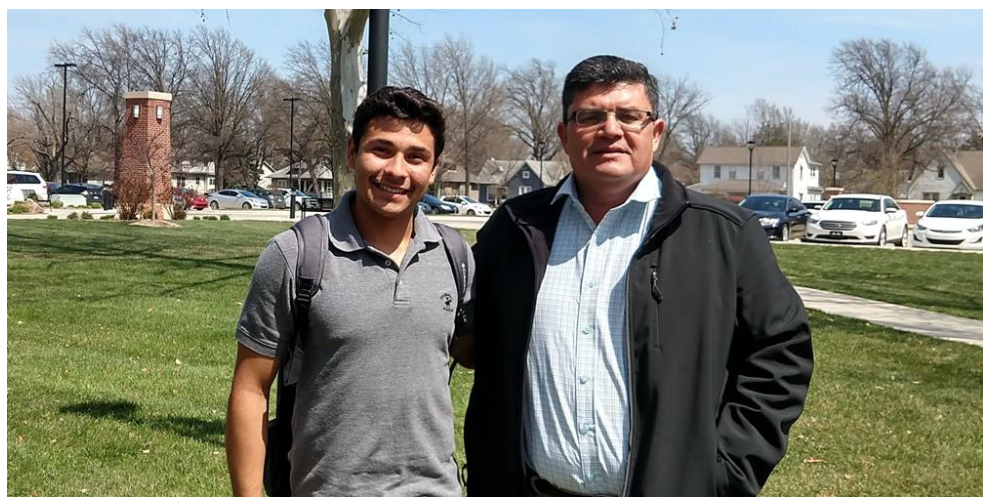
Hesston College student Brayan Martinez from El Salvador gives SEMILLA Director Willi Hugo Pérez a campus tour during his April visit to Kansas Mennonite colleges and churches. Photo from MennoniteMission.net
Last month, you helped us welcome the two newest Peacemaker in Action award recipients: Yeny Nolasco Quijada and Fatima al-Bahadly.
Yeny Nolasco Quijada and Fatima al-Bahadly, from El Salvador and Iraq, respectively, were selected from a group of highly qualified nominees for the Peacemaker in Action award.
Tanenbaum’s Peacebuilding program uplifts the voices of religiously-motivated peace actors, not just those within the Peacemakers in Action Network, but the many unsung heroes at the grassroots level, so that NGOs, academics, organizations, and governments consult their unparalleled wisdom and expertise.
Yeny and Fatima’s fellow nominees come from around the globe. They are motivated by their religious or spiritual beliefs to work peace, unrecognized outside of their local contexts, and put their life and/or liberty at risk.
Each month, we will profile some of the top Peacemaker in Action nominees.
May you know these brave peace actors, seek to work with them, and be inspired by them.
In April, we highlight Guatemalan peace actor Willi Hugo Pérez Lemus. Struck with loss early in his life, Lemus, propelled by his faith, created a Mennonite-organized peace initiative (MENOPAZ). Pérez provides an example of how trauma and indignation might be recast as a productive force.
Peacemaker in Action Nominee Profile: Top 20
Willi Hugo Pérez Lemus
Guatemala
Willi Hugo Pérez Lemus is no stranger to the fallout of protracted conflict. Growing up in Guatemala during the 1960s, violence was an everyday intimacy, a constant threat of social unravelling, of political alienation, and death. In 1960, an armed conflict broke out between leftist guerilla groups and the military-led, autocratic government. For 36 years, the civil war persisted in waves of horror and human rights violations, ending the lives of around 200,000 Guatemalans, many of them Mayan. Disappearances, mutilations, and the public dumping of bodies were commonplace. It should be noted that a U.N. truth commission found that the state and military groups perpetrated 93 percent of human rights violations. This was accomplished more effectively with the aid of U.S. funding and training.
In 1975, Willi Pérez came face to face with the government’s campaign of extra-judicial killings. A staunch proponent of peasants’ rights and living conditions, his father was disappeared and murdered by members of the Guatemalan army. The years that followed weighed heavily on Pérez and his family. Risk, insecurity, poverty, and grief enveloped them, and Pérez sunk into what those who know him describe as a “pit of pain and bitterness,” of “hate.”
Despite the trauma and disaffectedness, Pérez resurfaced in part thanks to the visceral faith of his mother. Eventually, he would join the Guatemalan Anabaptist-Mennonite community and commit himself to the Mennonite values which espouse justice, reconciliation, and the good of others. Pérez traced a path to emotional and spiritual recovery along the tenets of peacebuilding, non-violence, and restorative justice. He found a new solidarity walking and learning among Mennonite compatriots who shared similar visions of peace and misgivings toward civil war.
Pérez’s spiritual advances did not remain solely internal, nor were they restricted to his congregation. With an ambition to shore up the influence and legacy of the non-violent movement in Guatemala, he dedicated himself to the education of others. In the 1990s, Pérez played an instrumental role in the creation of MENOPAZ, a Mennonite-organized peace initiative. The association would go on to provide training in peacebuilding and conflict transformation in churches, schools, and community centers. MENOPAZ did not exclude itself from direct social activism.
Over the same years, Pérez worked to found and serve as the first coordinator of the Regional Network of Justice and Peace (REDPAZ). Through his tenure at REDPAZ, Pérez united churches and NGOs across Guatemala to provide local training in pastoral work with a focus on peace and reconciliation. Much of this work was mirrored in Latin American Anabaptist Seminary (SEMILLA), where he serves as rector. Collaborating with the 12 Central American Anabaptist conferences which comprise SEMILLA, Pérez founded the School of Peace. The School has since provided opportunities to the marginalized populations for study at Bible institutes, admitting around 800 pupils per year. The ecclesiastical formations rest, of course, on the principles of peace ministry.
Pérez provides another example—see Pastor James and Imam Ashafa—of how trauma and indignation which have seeped down to one’s bones might be recast as a productive force. Through his metamorphosis, deeply inflected with faith and the Mennonite community, Pérez has built an activist community of lasting effect. In the way of Jesus, he has found education to be an invaluable tool in the amelioration of the social, political, and spiritual circumstances of his brothers and sisters—those who have suffered and who yearn for peace.
Tanenbaum thanks Elaine Zook Barge, Retired Asst. Professor of the Practice of Trauma Awareness and Resilience at Eastern Mennonite University for nominating Willi Hugo Pérez Lemus.